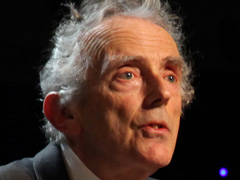Interview with Peter Burke, a well-known authority on social history of knowledge
In seeking to understand urban reality, Peter Burke cites the French philosopher, sociologist and anthropologist Bruno Latour when he defines cities as “centres of calculation where information is turned into knowledge”. He describes this as being akin to a culinary process in which information is submitted to operations involving criticism, verification, systematisation and classification in order to give rise to knowledge. This process has always occurred with particular ease in urban space, which may be seen as a kind of kitchen of knowledge. The physical agglomeration of people in a single place has favoured the concentration of great cultural institutions, for example museums or libraries, which are located not very far apart so that people can walk from one to another. Furthermore, smaller nodes of exchange tend to flourish around these centres, for example cafes where “people who knew things came together and talked about them”.
At least this was the case until two decades ago. Burke explains that, as of a certain point, cities started losing this role. First, with the coming of Internet, cultures as that of groups meeting in cafés have dwindled. Then again, the physical location of libraries has declined in strategic importance, although not completely since there are still many things that have not been uploaded. Moreover, urban sprawl has engulfed enormous metropolitan areas and, for Burke, the framework of intellectual sociability offered by urban public space breaks down once cities reach a certain size.
Burke, who previously specialised in Italian history, expresses his admiration for squares like Piazza San Marco in Venice and Piazza della Signoria in Florence. He says that although it is still possible, maybe, to sit down in these archetypical public spaces and have a coffee, it will be a very expensive and watery coffee thanks to the massive tourist presence overwhelming the space. Perhaps because such large groups of people tend to despoil knowledge rather than produce it, Burke prefers certain small squares in Genoa or Bologna. He says he needs more time to name his favourites. Maybe he believes it might be better if he doesn’t.



